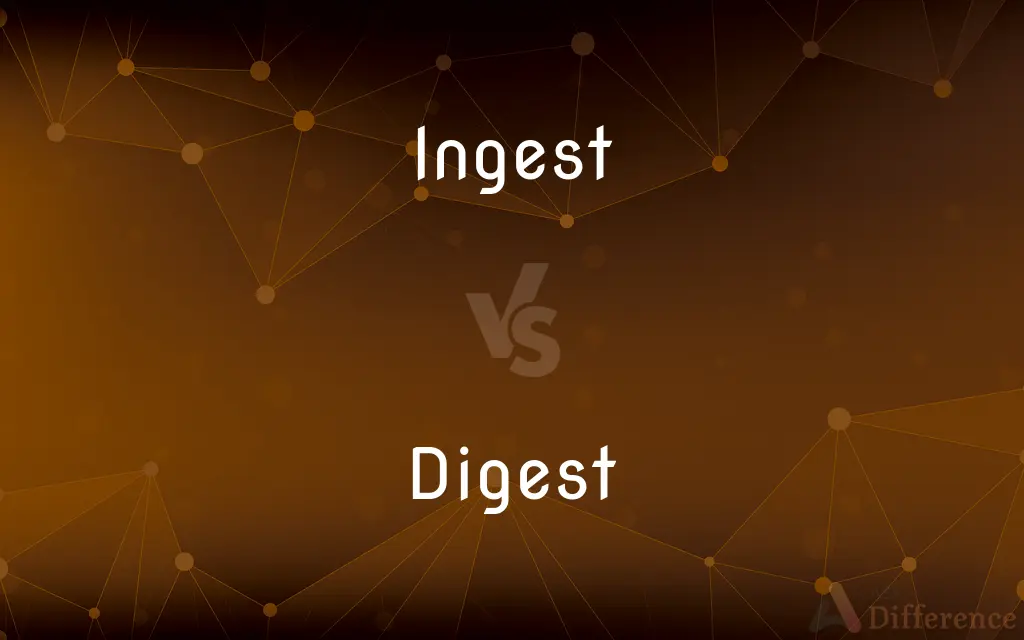Ingest vs. Digest — What's the Difference?
By Tayyaba Rehman & Urooj Arif — Updated on March 17, 2024
Ingestion involves taking substances into the body, typically through eating or drinking, while digestion is the biochemical breakdown of these substances into simpler, absorbable components.

Difference Between Ingest and Digest
Table of Contents
ADVERTISEMENT
Key Differences
Ingestion is the first step in the eating process, where food and liquids are taken into the body through the mouth. This process is primarily mechanical, involving actions like chewing and swallowing. On the other hand, digestion begins when the ingested food reaches the stomach and intestines, where it undergoes chemical breakdown through enzymes and acids.
While ingestion occurs voluntarily and involves conscious actions, digestion is an involuntary, complex process that happens without conscious control. Digestion relies on the body's digestive enzymes and various organs to convert food into nutrients that the body can use.
The purpose of ingestion is to introduce food and liquids into the digestive system for nutritional needs. In contrast, the goal of digestion is to break down these substances into smaller molecules like amino acids, fatty acids, and simple sugars, which are then absorbed into the bloodstream.
Ingestion can be influenced by factors such as appetite, taste preferences, and social settings, affecting what and how much is consumed. Digestion, however, is influenced by the composition of the ingested material (such as the mix of proteins, fats, and carbohydrates) and the body’s physiological state, including the presence of digestive enzymes and the health of the digestive tract.
In terms of health implications, improper ingestion (such as consuming contaminated food or overeating) can lead to immediate discomfort or illnesses. Conversely, issues with digestion (like enzyme deficiencies or digestive diseases) can lead to longer-term health problems by affecting nutrient absorption and overall metabolism.
ADVERTISEMENT
Comparison Chart
Definition
Taking substances into the body, typically food or liquid.
Biochemical breakdown of ingested substances.
Process Type
Voluntary and mechanical.
Involuntary and biochemical.
Primary Purpose
Introduce food and liquids into the digestive system.
Break down food into absorbable nutrients.
Influencing Factors
Appetite, taste preferences, social settings.
Composition of ingested material, body’s physiological state.
Health Implications
Immediate discomfort or illness from improper ingestion.
Longer-term issues from nutrient absorption problems.
Compare with Definitions
Ingest
The process of taking in information.
Ingesting the data was the first step in analysis.
Digest
To understand or absorb information thoroughly.
It took me a while to digest the complex information.
Ingest
The act of consuming substances for nutrition.
Certain medications are designed to be ingested orally.
Digest
To undergo a process to make something understandable or manageable.
The team digested the feedback into actionable items.
Ingest
To incorporate or assimilate into the body or mind.
Ingesting new ideas can be a slow process.
Digest
To break down food in the stomach and intestines into substances that can be used by the body.
The stomach digests proteins into amino acids.
Ingest
The intake of chemical substances into the body.
Plants ingest carbon dioxide for photosynthesis.
Digest
The reduction of complex substances into simpler forms.
Enzymes help digest complex carbohydrates.
Ingest
To take food, drink, or another substance into the body by swallowing or absorbing it.
Humans ingest food through the mouth.
Digest
The process by which the body converts food into energy and waste.
A healthy digestion system efficiently digests a variety of foods.
Ingest
To take into the body by the mouth for digestion or absorption.
Digest
To convert (food) into simpler chemical compounds that can be absorbed and assimilated by an organism, as by chemical and muscular action in the digestive tract.
Ingest
To take in and absorb as food
"Marine ciliates ... can be observed ... ingesting other single-celled creatures and harvesting their chloroplasts" (Carol Kaesuk Yoon).
Digest
To think over so as to understand; absorb or assimilate
It took a minute to digest the implications of the remark.
Ingest
(transitive) To take (a substance, e.g., food) into the body of an organism, especially through the mouth and into the gastrointestinal tract.
Digest
To organize into a systematic arrangement, usually by summarizing or classifying.
Ingest
To cause (an undesired object or fluid) to enter the engine, generally via the intake.
The plane's engine ingested a large bird and flamed out.
Digest
To condense or abridge (a written work).
Ingest
(transitive) To bring or import into a system.
Digest
(Biochemistry) To decompose (organic compounds), especially by the action of enzymes or bacteria.
Ingest
The process of importing data or other material into a system.
Digest
(Chemistry) To soften or disintegrate by means of chemical action, heat, or moisture.
Ingest
To take into, or as into, the stomach or alimentary canal.
Digest
To become assimilated into the body.
Ingest
To take into the body by any means, as by inhalation, injection, absorption, as well as through the mouth.
Digest
To assimilate food substances.
Ingest
Serve oneself to, or consume regularly;
Have another bowl of chicken soup!
I don't take sugar in my coffee
Digest
(Biochemistry) To undergo decomposition, especially by the action of enzymes or bacteria.
Ingest
Take up mentally;
He absorbed the knowledge or beliefs of his tribe
Digest
(Chemistry) To undergo exposure to heat, liquids, or chemical agents.
Digest
A collection of previously published material, such as articles, essays, or reports, usually in edited or condensed form.
Digest
(Law) A systematic arrangement of abstracts from court decisions designed to simplify the locating of relevant case law.
Digest
A periodical containing literary abridgments or other condensed works.
Digest
Digest See pandect.
Digest
A product of biochemical digestion
Purifying the peptides in a digest.
Digest
(transitive) To distribute or arrange methodically; to work over and classify; to reduce to portions for ready use or application.
To digest laws
Digest
(transitive) To think over and arrange methodically in the mind; to reduce to a plan or method; to receive in the mind and consider carefully; to get an understanding of; to comprehend.
Digest
To bear comfortably or patiently; to be reconciled to; to brook.
Digest
To expose to a gentle heat in a boiler or matrass, as a preparation for chemical operations.
Digest
(intransitive) To undergo digestion.
I just ate an omelette and I'm waiting for it to digest.
Digest
To suppurate; to generate pus, as an ulcer.
Digest
To cause to suppurate, or generate pus, as an ulcer or wound.
Digest
To ripen; to mature.
Digest
To quieten or reduce (a negative feeling, such as anger or grief)
Digest
That which is digested; especially, that which is worked over, classified, and arranged under proper heads or titles
Digest
A compilation of statutes or decisions analytically arranged; a summary of laws.
Comyn's Digest
The United States Digest
Digest
Any collection of articles, as an Internet mailing list including a week's postings, or a magazine arranging a collection of writings.
Reader's Digest is published monthly.
The weekly email digest contains all the messages exchanged during the past week.
Digest
(cryptography) The result of applying a hash function to a message.
Digest
To distribute or arrange methodically; to work over and classify; to reduce to portions for ready use or application; as, to digest the laws, etc.
Joining them together and digesting them into order.
We have cause to be glad that matters are so well digested.
Digest
To think over and arrange methodically in the mind; to reduce to a plan or method; to receive in the mind and consider carefully; to get an understanding of; to comprehend.
Feelingly digest the words you speak in prayer.
How shall this bosom multiplied digestThe senate's courtesy?
Digest
To appropriate for strengthening and comfort.
Grant that we may in such wise hear them [the Scriptures], read, mark, learn, and inwardly digest them.
Digest
Hence: To bear comfortably or patiently; to be reconciled to; to brook.
I never can digest the loss of most of Origin's works.
Digest
To soften by heat and moisture; to expose to a gentle heat in a boiler or matrass, as a preparation for chemical operations.
Digest
To dispose to suppurate, or generate healthy pus, as an ulcer or wound.
Digest
To ripen; to mature.
Well-digested fruits.
Digest
To quiet or abate, as anger or grief.
Digest
To undergo digestion; as, food digests well or ill.
Digest
To suppurate; to generate pus, as an ulcer.
Digest
That which is digested; especially, that which is worked over, classified, and arranged under proper heads or titles
A complete digest of Hindu and Mahommedan laws after the model of Justinian's celebrated Pandects.
They made a sort of institute and digest of anarchy, called the Rights of Man.
Digest
A periodical that summarizes the news
Digest
Something that is compiled (as into a single book or file)
Digest
Convert food into absorbable substances;
I cannot digest milk products
Digest
Arrange and integrate in the mind;
I cannot digest all this information
Digest
Put up with something or somebody unpleasant;
I cannot bear his constant criticism
The new secretary had to endure a lot of unprofessional remarks
He learned to tolerate the heat
She stuck out two years in a miserable marriage
Digest
Become assimilated into the body;
Protein digests in a few hours
Digest
Systematize, as by classifying and summarizing;
The government digested the entire law into a code
Digest
Soften or disintegrate, as by undergoing exposure to heat or moisture
Digest
Make more concise;
Condense the contents of a book into a summary
Digest
Soften or disintegrate by means of chemical action, heat, or moisture
Common Curiosities
What is ingestion?
Ingestion is the act of taking food, drink, or other substances into the body by swallowing or absorbing it.
How does ingestion differ from digestion?
Ingestion is the intake of substances into the body, primarily a mechanical process, while digestion is the biochemical breakdown of these substances into absorbable components.
Why is ingestion important?
Ingestion is important for introducing necessary nutrients into the body, which are essential for energy, growth, and cell repair.
What factors influence digestion?
The composition of the ingested material and the body’s physiological state, including the presence of digestive enzymes, influence digestion.
Can digestion affect mental health?
Yes, the process of digestion and the health of the gut microbiome can significantly affect mental health, mood, and stress levels.
What is digestion?
Digestion is the process by which the body breaks down food in the stomach and intestines into substances that can be absorbed and used by the body.
What role does digestion play in the body?
Digestion plays a crucial role in breaking down food into nutrients that the body can use for energy, growth, and repair.
What factors influence ingestion?
Factors like appetite, taste preferences, and social settings can influence ingestion.
Can you ingest something without digesting it?
Yes, some substances can be ingested but not digested, such as dietary fiber, which passes through the digestive system mostly unchanged.
What are common digestive system issues?
Issues like enzyme deficiencies, acid reflux, and irritable bowel syndrome can affect digestion and lead to longer-term health problems.
How do lifestyle choices affect ingestion and digestion?
Lifestyle choices, such as diet, exercise, and stress management, can have a significant impact on both ingestion and digestion, affecting overall health and well-being.
What are common issues with ingestion?
Overeating, consuming contaminated food, or ingesting allergens can lead to immediate discomfort or illnesses.
What is the role of enzymes in digestion?
Enzymes play a crucial role in digestion by breaking down complex molecules like proteins, fats, and carbohydrates into simpler forms that the body can absorb.
What is the significance of the digestive tract in digestion?
The digestive tract is where most of the digestion and absorption of nutrients takes place, making it essential for converting food into energy and waste.
How can digestion be improved?
Digestion can be improved by eating a balanced diet, staying hydrated, and managing stress levels.
Share Your Discovery

Previous Comparison
Sceptical vs. Skeptical
Next Comparison
Plump vs. ChubbyAuthor Spotlight
Written by
Tayyaba RehmanTayyaba Rehman is a distinguished writer, currently serving as a primary contributor to askdifference.com. As a researcher in semantics and etymology, Tayyaba's passion for the complexity of languages and their distinctions has found a perfect home on the platform. Tayyaba delves into the intricacies of language, distinguishing between commonly confused words and phrases, thereby providing clarity for readers worldwide.
Co-written by
Urooj ArifUrooj is a skilled content writer at Ask Difference, known for her exceptional ability to simplify complex topics into engaging and informative content. With a passion for research and a flair for clear, concise writing, she consistently delivers articles that resonate with our diverse audience.













































